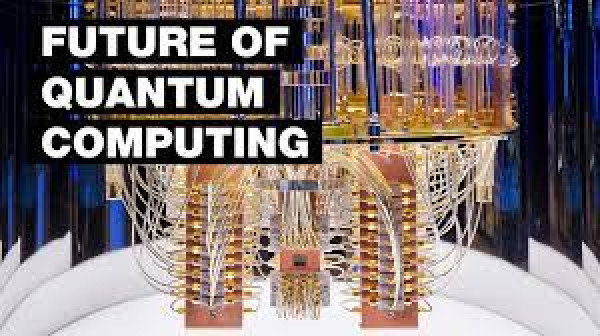
The Future of Quantum Computers
by.
Hendrikus Franz Josef, M.Si,
(International Relations Observer, CEO The
https://www.youtube.com/@thehendrikuscenter2794)
Quantum computing is one of the most exciting technological advancements of our time, with the potential to revolutionize the way we solve complex problems in science, finance, cryptography, and more. While the technology is still in its early stages, experts predict that quantum computers will become increasingly powerful in the coming years, ushering in a new era of computing.
A traditional computer stores and processes information in bits, which can represent either a 0 or a 1. In contrast, a quantum computer uses qubits, which can exist in a state of both 0 and 1 simultaneously, allowing for vastly more complex calculations and processing of data. This makes quantum computers ideal for solving problems that are beyond the capabilities of traditional computers, such as simulating complex chemical reactions, optimizing supply chains, and breaking encryption codes.
The future of quantum computing is bright, with rapid advances being made in the field. Major technology companies such as IBM, Google, and Microsoft are investing heavily in quantum computing research and development, and governments around the world are funding quantum computing initiatives.
One of the biggest challenges facing quantum computing is scaling the technology. While quantum computers have the potential to be incredibly powerful, they are also extremely difficult to build and maintain. The technology requires precise control of qubits, which are extremely sensitive to interference from the environment. As a result, quantum computers are currently only capable of processing small amounts of data and are prone to errors.
However, researchers are making significant progress in developing new methods for controlling qubits and reducing errors. This includes the development of new materials and hardware architectures, as well as the use of machine learning algorithms to improve error correction.
Another exciting development in quantum computing is the emergence of quantum cloud computing. Rather than building and maintaining their own quantum computers, businesses and researchers can now access quantum computing resources through cloud-based platforms. This allows for faster development and testing of quantum applications and lowers the barriers to entry for businesses and researchers who may not have the resources to build their own quantum computers.
The potential applications of quantum computing are vast and varied. In finance, quantum computing can be used to optimize investment portfolios, calculate risk more accurately, and detect fraud more effectively. In healthcare, quantum computing can be used to simulate complex biological systems and develop new drugs more quickly. In cybersecurity, quantum computing can be used to break encryption codes, but it can also be used to develop new encryption methods that are resistant to quantum attacks.
One of the significant functions of quantum computers is their ability to perform calculations and solve problems that are beyond the capabilities of traditional computers. This is due to the unique properties of quantum mechanics, which allow quantum computers to process information in ways that are impossible with classical computers.
In particular, quantum computers can perform calculations using qubits, which can exist in a superposition of states, meaning they can represent both 0 and 1 at the same time. This allows quantum computers to consider multiple solutions to a problem simultaneously, leading to much faster and more efficient processing of information.
One important application of quantum computers is in simulating complex systems, such as chemical reactions, materials science, and biological systems. These simulations require vast amounts of processing power and are beyond the capabilities of traditional computers. Quantum computers can simulate these systems more accurately and efficiently, leading to breakthroughs in drug discovery, materials science, and other areas.
Another significant function of quantum computers is in cryptography. Quantum computers have the potential to break many of the encryption schemes used today, leading to major security concerns. However, they can also be used to develop new encryption methods that are resistant to quantum attacks, providing a new level of security for sensitive data.
In addition, quantum computers can be used for optimization problems, such as supply chain management, logistics, and scheduling. These problems are notoriously difficult for traditional computers to solve, but quantum computers can find optimal solutions much faster and more efficiently.
Overall, the significant function of quantum computers is their ability to process and manipulate information in ways that are beyond the capabilities of classical computers. This opens up new possibilities for solving complex problems in science, finance, and other areas, and has the potential to transform the way we live and work in the future.
In conclusion, the future of quantum computing is bright, with rapid advances being made in the field. While the technology is still in its early stages, it has the potential to revolutionize the way we solve complex problems in science, finance, and more. As quantum computers become more powerful and scalable, we can expect to see a proliferation of new applications that will change the way we live, work, and communicate.
Opini Lainnya
 Touring & Outbond BPAD
Touring & Outbond BPAD
Pada hari sabtu, 18 Mei 2013, BPAD menyelenggarakan kegiatan turing dan outbound. Kegiatan ini dilaksanakan di Kompleks Makam...
 OLEH-OLEH DARI JEPANG BAGIAN KETIGA
OLEH-OLEH DARI JEPANG BAGIAN KETIGA
OLEH-OLEH DARI JEPANGSuatu pengalaman ketika ditugaskanke Kyoto Jepang selama semingguOleh :AlipSudardjoBAGIAN KETIGA Kunjungan...
 DUA FUNGSI UNTUK SATU TUJUAN
DUA FUNGSI UNTUK SATU TUJUAN
Selama ini kita mengetahui bahwa bidang perpustakaan dan kearsipan menurut Peraturan Pemerintah Nomor 38 Tahun 2007 tentang...
 From Sister Province to Sister Libraries: Sebuah Kesempatan Kerj
From Sister Province to Sister Libraries: Sebuah Kesempatan Kerj
Tanggal 25 Oktober 2010 menjadi momen bersejarah bagi Provinsi DIY dan Kyoto Prefecture. Peringatan 25 tahun kerjasama antara...

 Penyerahan Buku KCKR dari Lintang Pustaka Utama
Penyerahan Buku KCKR dari Lintang Pustaka Utama